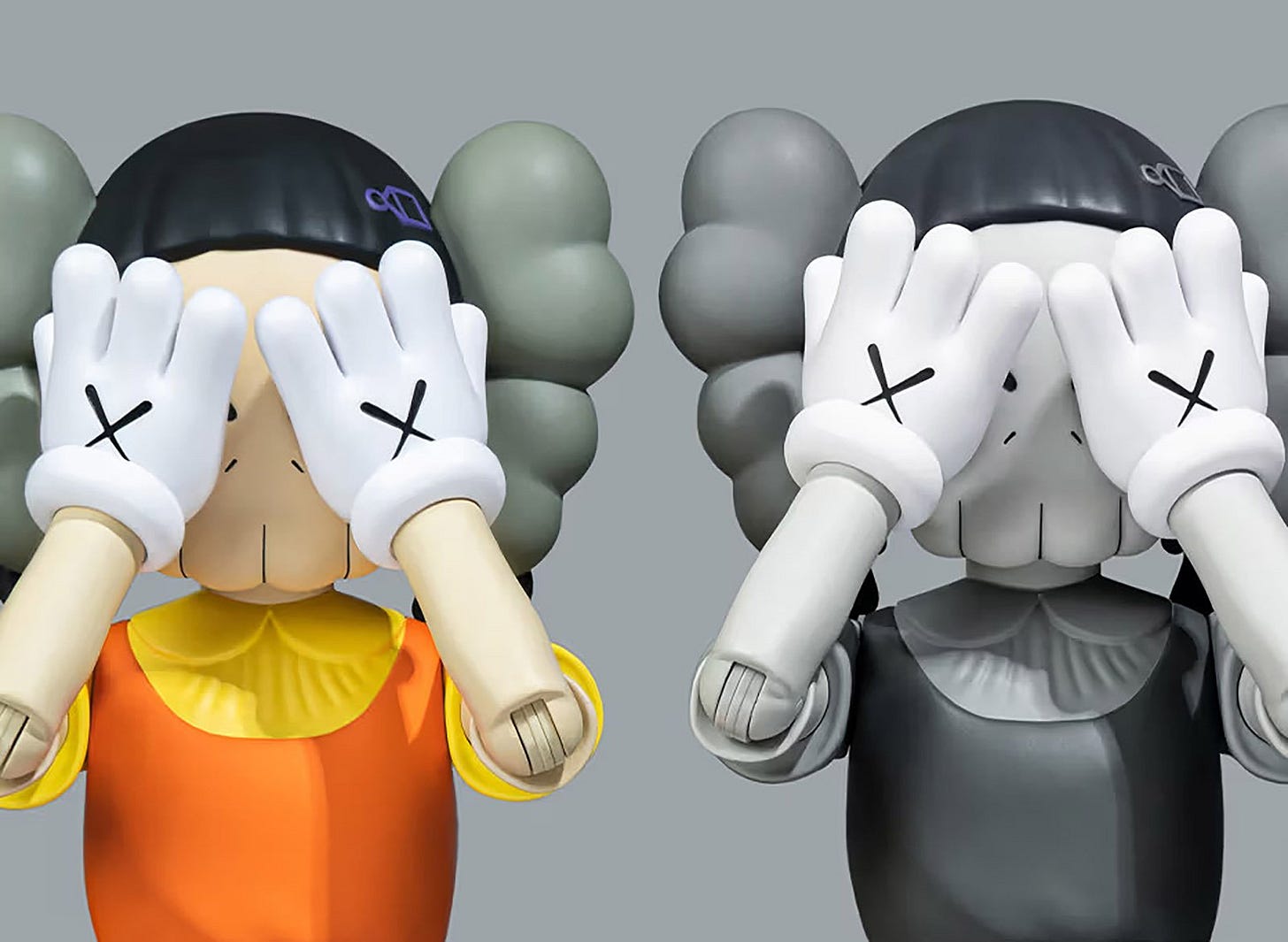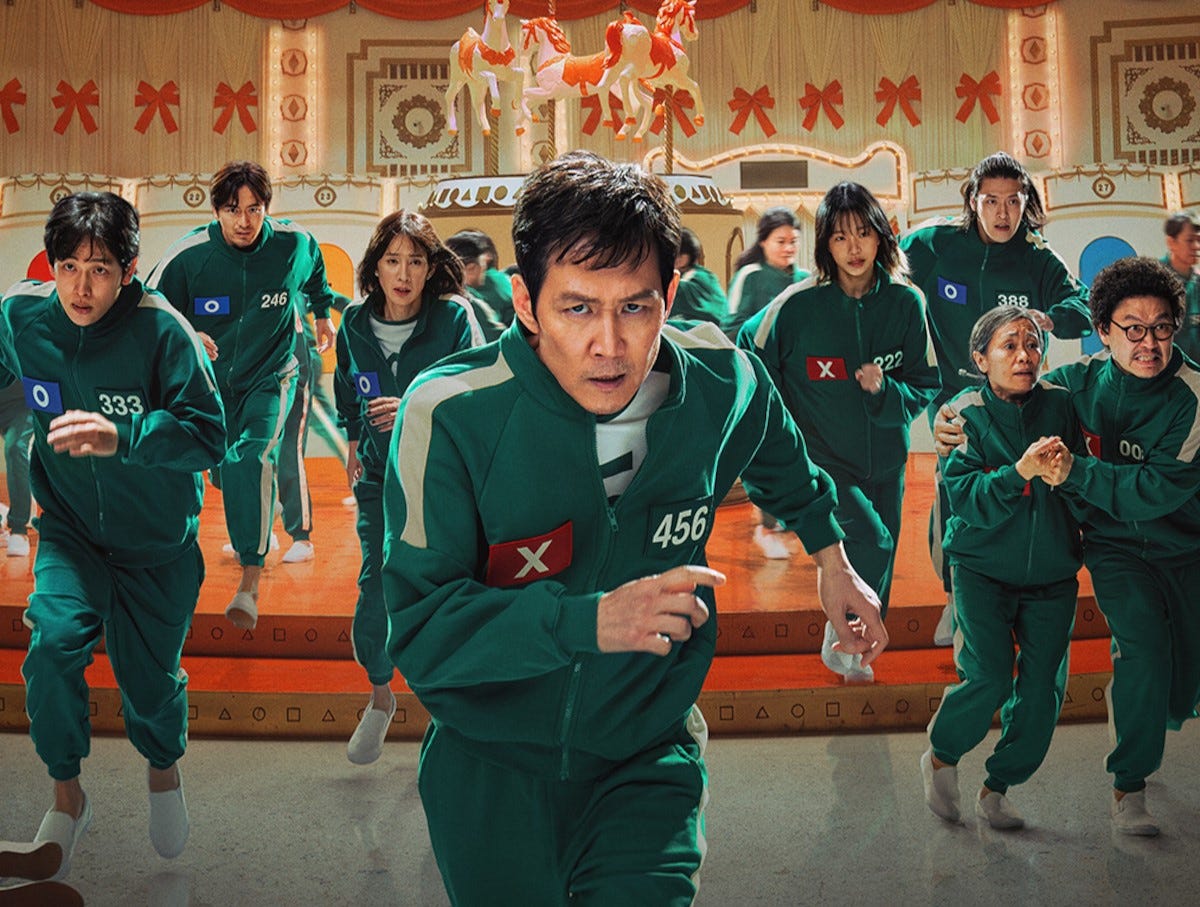I binged Squid Game when it first came out, devouring the entire season through a single sitting. It wasn't exactly thought-provoking, I found it actually rather corny, but I was still locked in. The premise was strong, the set and costume designs were creative, and the games were thrilling. For those uninitiated, Squid Game is a Korean show where our main character, Seong Gi-hun is a humble gambler down on his luck. He’s indebted to loan sharks, his mother turned ill, and the only bright spot in his life, his daughter, is being whisked away to America by his ex-wife. The only barrier to these issues is a matter of income yet these barriers are so insurmountably high for even a middle-class person, as I'm sure many of us living in a capitalist environment can attest to, it's practically impossible for a person in poverty like Gi-hun. Desperate for money, he is lulled into a secret survival game filled with others just like him. The rule? Be the last one standing. The series carries on with contestants playing popular Korean children’s games with the twist that losing costs you your life. The real kicker is the amount of players who, after given the option to return to their normal lives, would rather die trying as surviving would mean no longer being in poverty. The series becomes a colourful and bloody reflection of the violent dog-eat-dog climate of capitalism.
Although deeply engaging, this isn't exactly an original way of depicting the cruelty of capitalism. The manga and anime adaptation Kaiji is the predecessor to Squid Game, being a near replica with the only difference being that the games are all gambling adjacent. We've also been experiencing an over saturation of “eat the rich” movies and shows that typically fit into either of the following categories:
A posse of sadistic rich people toy with the life/lives of the middle/lower class, typically resulting in a story of survival (think Ready or Not or Hunger Games)
A middle/lower class person getting revenge on the rich who has disempowered them on a personal and marginal level (think The Menu)
A gotcha against the exuberant lives of the out-of-touch ultra rich (think Knives Out)
I've been frankly exhausted by these “capitalism bad” movies and TV shows that aren't actually challenging the system in a meaningful way but simply pandering to us working class people saying “look, it's you!” These films won't even risk hiring new small actors to draw in a crowd so we get a bunch of rich talking heads acting like they understand the struggles of the average civilian. These films spend and rake millions while the staff that helped create it are renting apartments and budgeting their income. At what point does this content invoke a conversation that isn’t just common knowledge? We know already that the rich suck us dry, these movies and shows are just regurgitating a surface level understanding of our grief in a gimmicky and commodified way. Furthermore, the real life CEO’s and politicians responsible for our anguish aren't being held accountable from these works of fiction. The representation of the rich are typically old money families with eccentric and naive personalities, like the Rose family from Schitts Creek but if they were placed in a more morbid setting. Their murderous behavior isn't that of exploiting the working class, lobbying conservative politicians, or colonizing foreign countries, but quite literally playing games within the confines of their mansions. What their actual jobs are and how that by itself is grotesquely inhumane is left out of the story. Their money doesn’t exist by evil means, just that they use their money in fictitiously villainous ways. In Squid Game, the elites that bet on and host the games, dawning animal masks and making cringeworthy quips, have their actual day jobs remain undisclosed. In reality, the ultra rich don't need to enjoy and voyeur the suffering of others to still be evil, in fact the problem is that they usually turn a blind eye.
Squid Game debuted on Netflix mid September and only a few weeks after that, Spirit Halloween already mass produced cheap costumes for October. There is simply no way these costumes were made in such a short amount of time under ethical means. Although this wasn't official Squidgame merch (we all know Spirit Halloween is never in the mood for legal licenses) this was a concerning sign. The iconography and visual designs of Squidgame was identifiable, marketable and highly lucrative. Squid Game costumes were frenetic in 2021, people marched around in pink jumpsuits, green athleisure, or in some cases, a sexy Young-Hee. How many of these people just had similar clothes laying around in their homes? What's more likely is that to celebrate their fanaticism of the supposed anti-capitalist sensation, people purchased the mass produced mimicks of Squid Game’s wardrobe or anything as close to it as possible, brandishing their love of the series and showing off the accuracy of their recreations. Once Halloween ended though, the costumes became redundant and were discarded shortly after, adding to the never ending landfill that weighs down our earth. Although any of us can end up in Gi-hun’s shoes, those of us who spend money on menial things for one time use are further from that risk than they even realize.
It doesn't end there, a real life game show of Squid Game was adapted with horror stories of how the contestants actually experienced inhumane conditions. This is different from the Mr. Beast version where just the spectacle of a multi-millionaire entrepreneur occupying acres of land to have tons of everyday people run around for YouTube content is already antithetical to the original story.
The Mattel fashion doll series Monster High recently revealed their newest collector doll, a yassified doll version of Squid Game’s elementary school robot. This time it’s an official collaboration with the Squid Game franchise and just one marketing ploy of many preceding the hype for the upcoming second season. Mobile games, Funko pops, collector collaborations, and so on; Squid Game has become a parody of itself, a trashy theme park with no fences. What's more peculiar is how people seem to eat it up, the same people who supposedly praised Squid Game for its commentary on capitalism. People are eagerly anticipating the drop of the Monster High Doll, racing resellers to the punch, impulsively willing to throw $65 USD plus shipping to shelve a doll that is really only as valuable as it's brand. Mattel has been exposed for its abusive and exploitative working conditions in Southern China,The Independent reporting “factory workers are given “excessive production quotas”, whilst earning less than £17 for an 11-hour shift, and often forced to work over 100 hours of overtime per month.” The actual construction of these dolls, treated with highly value and limited quantities, really only took pennies to produce, no thanks to capitalism that allows big American corporations to exploit the labour laws and corrupt governments of other countries. However, this might be considered reasonably priced in comparison to the $250 USD KAWS figurine of the same mascot character. The practice of collectables is a hot button topic but the ethics of it are undeniably poor. Over-consumption is environmentally damaging and is only exercised through the excessive purchase of material goods. KAWS is a Murakami, which is to say, a sellout. Rather than buying something from KAWS out of genuine support and admiration for the artist, it's really only to showcase class status or to own something valuable and popular. The cartoon skeleton isn't art that represents anything but an aesthetically appealing contemporary sculpture mass produced rather than handmade. To buy a KAWS Young-hee isn't class solidarity and especially not because the plot of Squid Game resonated with you. No poor person could invest that kind of money for a plastic figurine. All it comes down to is pure consumerism and the lust to put a shiny thing in your glass cabinet. Squid Game is a Netflix original in the end and merch is its inevitable outcome.
I won't blame the current dark irony of Squid Game’s commercialism on the show creator, Hwang Dong-hyuk, who has earned his accolade for being able to tell a riveting narrative with a creative concept. However, I wonder if Dong-hyuk could or would dive into the more raw issues of capitalism beyond the grimly digestible trope of survival games against the rich. Many directors have contorted the same ideas with different backdrops and character names but in the end always portray the same shallow understanding of why the rich are so detestable in our eyes. Could Dong-hyuk be bold enough to challenge the roots and real impacts of capitalism outside the fantastical bubble of Squid Game? Does he even under the nuances of it himself? Where in his own daily life does he practice anti-capitalist values beyond the stories he would profit from? The show, as earnest as it may have been, has fallen into some questionable tropes. The only explicitly gay character was a predator and one can't help but feel that his queerness--as well as his bigger, older and hairier body--is meant to elicit repulsion from viewers in order to embody the “perversion” of the rich elites (which makes me incredibly worried for how the trans character will be treated and written in the second season). Similarly, the delinquent characters who aren’t afforded the same complexities and empathy as the “heroes” also seem to be victims of lookism. Jang Deok-soo was nothing more than the sleazy and violent jailbird while Han Mi-nyeo would flirt with men who she felt would benefit her. These two characters were visibly older and the former had a bigger body and less conventionally attractive features. This may have been a deliberate choice to stave off any support for these characters despite the fact everyone is in this predicament for a valid reason and all of them are fighting tooth and nail. Looking at the cast of actors, hardly any of them represent the average Korean citizen. Most have conventionally attractive faces and bodies where the more diverse appearances are left to the extras or antagonists. The only exception is Abdul Ali who was definitely a much needed spotlight on the exploitation of immigrant workers (although that was also briefly skimmed). When the creator seems to have a morally righteous and superficial idea of the different forms poverty can take, I can't help but feel like a second season isn't going to expand on the subject of capitalism in any fruitful manner. Rather, the cruel yet creative setting of Squid Game is just going to be recycled with a new set of characters and games to keep it refreshing, Total Drama Island style (although I can be proven wrong!). And during all of it, I expect that more Squid Game memorabilia and attractions will be churned out, feeding on the frenzy of middle class consumers with enough money to spend indulgently while the hands that make it bleed.








I need to add: those are NOT garbled thoughts. I hope you are not always so self-deprecatory. World surely has enough chest-pounders but your thoughts deserve much attention.
I thought I was the cynical one and thought I was alone in this.
I should have known better.
Thank you for clearly writing it down!